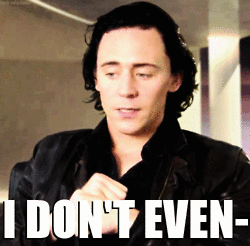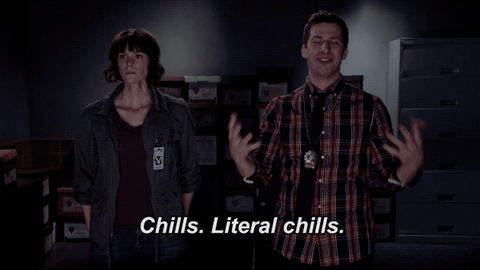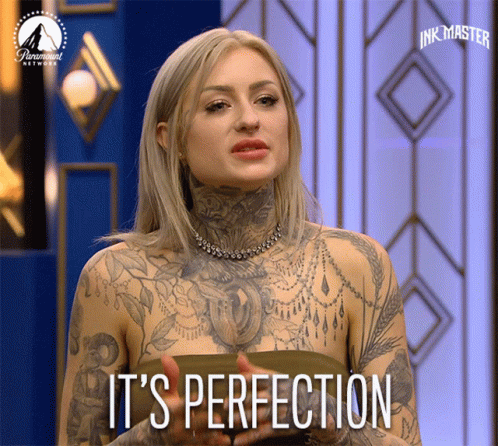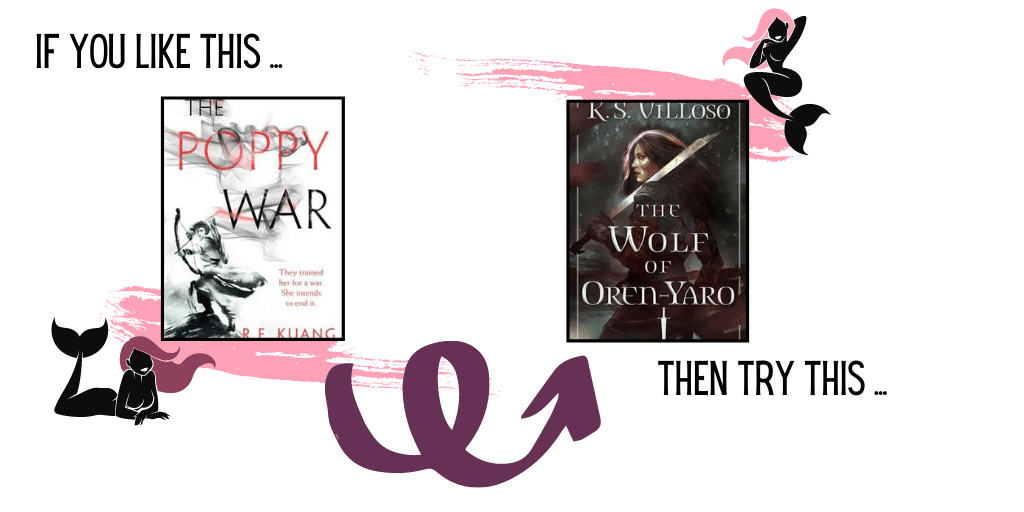
Title: The Poppy War (The Poppy War #1)
Author: R. F. Kuang
Genre: Adult Fantasy
Format: Hardcover & Audiobook
Length: 530 pages; 18 hours, 57 mins
Narrated By: Emily Woo Zeller
Publisher: Harper Voyager
Release Date: May 1, 2018
Setting: Nikara Empire

Thank you to Adri @ Perpetual Pages for this extensive list of content warnings. I would have missed some if they didn’t have it all written.
Graphic descriptions of blood, gore, violence, rape, bodily mutilation, dismemberment and dead bodies; mentions of massacres, infanticide, human trafficking, and human experimentation; instances of colorism/racism, misogyny, substance abuse/addiction, use of mind-altering drugs, verbal/physical abuse. Additionally, some instances of unchallenged ableism.

Chinese-coded, Japanese-coded, Taiwanese-coded, East-Asian-coded

Thank you so much to the team at Subtle Asian Book Club for hosting The Poppy War as the August read. It gave me the opportunity to listen to the audiobook and experience this story for a second time. The club has a Facebook Group and a Discord group if you’re interested in joining. Next month is going to be The Dragon Republic, the sequel to The Poppy War and I am so excited to talk about that as well!

- Okay everyone keeps warning me about this Chapter 21 business and I’m kind of freaking out now. Should I just skip the chapter? Do I have to mentally prepare myself? What is going on??
- I can’t even think about anything else now. Now I psyched myself out because of this ominous chapter. Thanks everyone.


The public education system in the United States is sorely lacking
I know the majority of us already knew this even before Kuang wrote this novel and published it, but I believe that the glaring discrepancies between what we are taught in school and what Kuang taught us in this novel are large and quite frankly, disturbing. History has always been told from the eyes of the victor, and it’s no surprise that the United States would censor certain… atrocious moments in history because it doesn’t align with how they want the public to view them. Mostly their own citizens, because I honestly don’t think that the majority of us would look past what we are taught and just go with what we are told. Which is a shame and does not put the full story into perspective.
If you haven’t read this novel yet, you are probably wondering why I’m including this as not only one of the themes of this novel, but the very top theme of this novel. I can summarize it in four words, although those words would barely do it justice: The Rape of Nanking.
In order to protect those that may be triggered by such wartime violence as what occurred during this massacre, I will not include any embedded videos or photos of what I have been able to find during my brief search. However, I will link some resources here in case you would like to look into it more.
- Documentary from The History of China
- Article from History.com
- Interview with “The Rape of Nanking” Author Iris Chang from CGTN
- Article from The History Place
Have you heard of this event? Did you know that this was during the Second Sino-Japanese War? Did you know that this event was not only an episode of mass murder, but it was also an episode of mass rape? I know that when I was learning about world history in high school, this NEVER came up. Which is sorely unfortunate because world history in the United States spends barely a day on Asian world history, but will spend weeks on European world history – both before and after WWII. Why is that? These events weren’t isolated, and it’s not like other countries in Asia weren’t affected by what was going on in the world. But why is this something that isn’t talked about? I asked those questions when I was reading this novel, and when I was listening to the discussion between some other members of the subtle asian book club. For someone like me, who is both Japanese and Chinese, I felt extremely uneducated about something that happened in my history, something that happened on both sides of my history, and felt like I would have been forever in the dark about such an event if I hadn’t learned about it through this novel. Sure, it is not Kuang’s job to teach us about world events, and that responsibility should not fall on her shoulders just because we were let down by our education system, but I truly appreciate her bringing this war, and this event to the light for those to understand that although this is technically a fantasy, it is based on true historical events. The things that you read in this novel came from somewhere in history. Kuang also said in an interview that what you experience in Chapter 21 was almost verbatim of what her research told her. She didn’t exaggerate anything, and when you think about it, it may make you even more sick.
The actions of past wars can have an everlasting effect on many generations to come
This one may seem really obvious, because this is very clear in real life as well. But knowing that we don’t have the whole story of what happened in the first two Poppy Wars that took place prior to the beginning of this novel – this is the Third Poppy War so far – it seems like we don’t need the full and complete back story to see how those wars have damaged and fractured Nikara ever since. Despite the provinces being united under one banner – first from the Red King and second from Empress Su Daji – that history of mistrust of one another and the opium addiction from the Mugen Federation is still heavily affecting the Empire to this day.
It’s not just past wars that have an everlasting effect on generations, but also past actions in general. It seemed really prominent and jarring in this novel, and as I’m currently reading the sequel right now, it becomes even more clear the more you go through this story.

One of my favorite things about this novel is that our main character Rin is definitely not a perfect character. She does not magically learn how to be a better person by the time this book is over. In fact, towards the ending, she does something so atrocious from a logical person’s standpoint, that it really makes the reader think about whether or not Rin was justified in doing said thing. Like, seriously that was a pretty drastic and dramatic action. I think when I was reading that part, I had to take a pause and think about how that legit just happened, and the ramifications of what Rin ended up doing.

I’m telling you, I was shooketh.
I also thought it was funny that there were a bunch of adults that Rin encountered throughout the story that would tell her how stupid she is, and honestly sometimes they are right, but then I like how she will prove them wrong, or do something super dramatic that kind of just rubs it in their face. So clearly I liked Rin even though she wasn’t perfect.
Then of course Kitay and Nezha! I had a feeling when I was reading this that they were going to have pretty important roles in this trilogy, and from what I’ve heard about the next two books, that was definitely correct! I was really happy with the friendship that grew between Kitay and Rin, and I thought it was really cool of him to include her in his holiday going home and showing her how the filthy rich lives. I say this because since Rin literally grew up poor, and people at Sinegard would berate her for growing up poor, and dark-skinned, and in one of the southern provinces…. Kitay never judged her for any of those things that she had no say in her life. Plus, I just really adored Kitay as a person. He was hella smart – still is, my bad – and I felt like he just had really great strategic prowess for a young one. Super impressed.
Disclaimer: I thought Nezha was a certified dick the first time I read this novel. And for the majority of the story until the tides turned and he and Rin had to fight together to defend Sinegard. Somehow, he semi-redeemed himself in my eyes and I was lowkey shocked that now I had some positive feelings about him. And when he disappeared from the the storyline, I was dying to know if I would see him again in the future and would have been devastated if I didn’t. How often do I have drastic emotional changes about a character like that? Not very often at all. So I was impressed with that change of heart that I had, and that Nezha did end up deserving by the time he disappears from the novel.
And of course, the Cike.
Ahh so many thoughts about this group of people right here. To the point that this would be an even longer review than it already is. Just… wow. If you need only one reason to read this novel, read it for the Cike. Read it from Ramsa the most. That’s all I’ll say on that.

Clearly there were a lot of emotions going through my mind while I read this novel. Both times I went through this novel, I was feeling different things. I don’t know whether reading it physically gave me a stronger emotional pull to it, or if it was the work of Emily Woo Zeller giving a voice to these characters that I could only imagine. I still don’t know, but I do know that there is a reason why Emily Woo Zeller is one of my all time favorite audiobook narrators, and this definitely was added to my list of favorite books that she got to narrate. There’s just something about her voice that makes me really connect with the story on a different level, so the combination of her voice and Rebecca’s words is just absolutely stunning.
As you saw earlier, I was angry and I felt rage the way that Rin did, but I could never feel the same rage that she did because I didn’t live through it. But I was hella pissed off for her. I wish I could have done something to help her, and I just felt like I hated people during this book. Seriously, it was hard to find any sort of redeeming qualities in just about anyone while reading this book, even if some people weren’t as terrible as others.
I saw if you don’t feel anything while reading this, I don’t understand. I know I can be more sensitive in general than a lot of people, but I feel like there is absolutely no way that someone can’t feel anything, you know?

From my understanding, Rebecca wrote most – if not all – of this book when she was in grad school? So maybe some of it almost wrote like a dissertation? I mean, I’ve never wrote a dissertation before and I don’t read them for fun, so maybe I’m off in my thinking on this, but either way I really enjoyed the writing style. I feel like it sounded pretty academic because of when Rebecca would explain the backstory and decisions of the past, in order for us to get a better picture of why things were how they were in the present. It made sense too since Rin was learning a lot of these things during her time at the Sinegard Academy as a student, so we were in essence learning at the same time as her. And while she does have prior knowledge about things that we didn’t see take place in this story, we are still able to understand what she knows through her thought process on certain situations. I’m having a hard time putting these thoughts into words right now, but basically I get where Rin is coming from, and I can understand what she is thinking about and the history of what she knows, without feeling like I’m completely lost or just ignorant to the point of not understanding at all. Rebecca does an absolutely amazing job at doing that, and the strength in her writing is stunning. Seriously, knowing that I’m in the middle of the sequel while I write this review, I can honestly say that her writing just continues to get better with each book that I’ve read. It makes me so excited to finish the trilogy, and I can’t wait to see what else she writes in the future.




The whole reason why this review took ten thousand years to write was because I knew I couldn’t do the book justice. I know that so many people have just fangirled all over the place about this novel, and I know that so many people are able to articulate why this is such an amazing book in much better words than I ever could. But even if this review makes absolutely no sense, is too long, or just doesn’t sit right with you, the main message is that this was a terrific, terrifying, and stunning novel that I think almost everyone should read.
I say almost everyone because I don’t want anyone being triggered by the gore in this novel if they can’t handle it.


- Forever and Everly (Southeast-Asian #ownvoices)
- Inside my Library Mind
- With Love, Saoudia
- The Tsundoku Chronicles
- Daydreaming Ink
- Ysa Not Bella


The Black Tides of Heaven was such a great novella, and honestly I’m sad that it was super short because that story was heartbreaking and beautiful and just magical. Yang did such an amazing job with this, and their world and the way that they delved into the characters and background of this plot was just breathtaking. It almost made me forget that it *was* a novella, and it felt like everything that needed to be told was told. This is the first part of a four part series though, so if you feel like you need more of this world, you definitely can fulfill that need!

I definitely owe this book a re-read before the sequel comes out. Oh my gosh Talyien reminds me of a mix of Rin and Su Daji somehow, and it just gives me all the bad ass bitch vibes. I could see Rin growing up to be similar to Talyien possibly, although she just has to get there, you know? I love both of these authors and both the stories that they created was just perfect. Both of these are debut novels as well – published in different years – and worth a read. You may have to add both of these authors to your insta-buy list.


I don’t even remember when I started trying to write this review, and I don’t even remember how many times I tried to sit down and write something and I just couldn’t formulate the correct words… but I did it! It’s finally out in the world, it’s finally on my blog for some safe-keeping and nostalgia, and I’m so proud of me for getting it done!
If you stuck with me until the end, you are amazing. Truly amazing for reading that much. If you read some sections, I appreciate that too! That’s what the sections are for, of course! Don’t forget to read the reviews that I linked up above to see even more thoughts on The Poppy War, and get excited to hear more about The Dragon Republic, and the upcoming conclusion to this trilogy: The Burning God.
I’ve heard that once you finish the series, you don’t know what to do with life. I dig it. I bet I’ll be the same. I can’t freaking wait.


hey leelynn! may is thai, which is a southeast asian country!
LikeLiked by 1 person
Thanks Caitlin! Let me change that.
LikeLike
Such an amazing review! I really love loved this book as well!
Also I just bought The Wolf of Oren-Yaro, and now I’m even more excited to read that one! And I guess I need to check out The Black Tides of Heaven as well!
(www.evelynreads.com)
LikeLike
i loved this review omg! it was so well rounded and i love how you gave suggestions at the end! thank you for linking my post!
LikeLike
Definitely adding this to my tbr! I think books like this are such a good way to learn more about history we might not have heard about, especially when they have such good characters 😊
LikeLike
Great review Leelynn!!! This is on my TBR but still not managed to pick up. Hopefully by the end of the year it will be read!!! ❤❤
LikeLike
I really need to read this book!
LikeLiked by 1 person
This review is PERFECT!
LikeLiked by 1 person
This book takes you on an emotional roller coaster and I agree that it shows how the history we taught is distorted.
LikeLiked by 1 person
This review was fantastic, Leelynn! This is my first time that I’ve heard that The Rape of Nanking was a major theme of this novel, and I’m really glad that you mentioned it. I did a report on it in high school for an English class – not even World history 😕. I’m really glad the book lived up to the hype for you 😄! (I’m probably going to have to put it off for now 😅.)
LikeLiked by 1 person
Great review! I want to read this even more now!
LikeLiked by 1 person